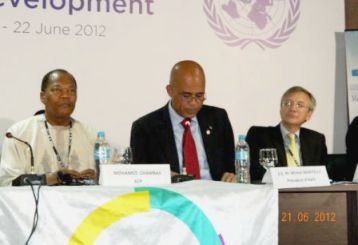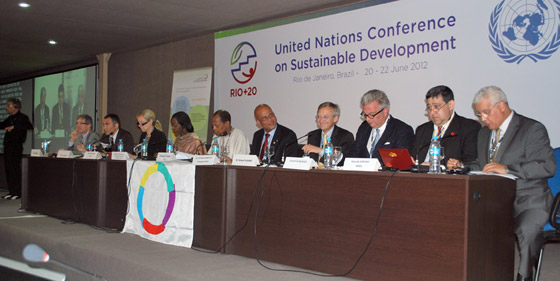South-south cooperation “a must” for universal access to energy
 27 June 2012, Brussels/ ACP: Technology-transfer amongst developing countries is essential to bringing energy access to the poorest of the world,argued leading figures at a recent panel event co-organised by the African, Caribbean and Pacific (ACP) Group of States and the Organisation Internationale de la Francophonie (OIF) at the Rio+20 conference in Brazil last week.
27 June 2012, Brussels/ ACP: Technology-transfer amongst developing countries is essential to bringing energy access to the poorest of the world,argued leading figures at a recent panel event co-organised by the African, Caribbean and Pacific (ACP) Group of States and the Organisation Internationale de la Francophonie (OIF) at the Rio+20 conference in Brazil last week.
Several Heads of States, government ministers, and leaders of international organisations called for stronger synergies, solidarity and partnerships amongst each other, especially in sharing information and knowledge that could lead to positive results in renewable energy use.
“Poor countries are the ones paying the most expensive bill on energy. Unless the international community agrees to settle collectively that bill and catalyze universal access to energy, achieving sustainable development in ACP countries will never become a reality,” said ACP Assistant Secretary General Achille Bassilekin III who helped organise the side event, titled South-South and Triangular cooperation: An innovative solution to achieve Sustainable Development Goals (SDGs).
“While the leadership of the governmentis recognized as critical in creating the enabling environment to catalyze universal access to energy, fostering partnerships with the private sector and various national, regional and international actors were underscored as key ingredients for success.”
Nine high level speakers, including the Presidents of Benin and Haiti and executives from the ACP, OIF and United Nations shared South-South cooperation success storiesin the exploration, the exploitation and the distribution of energy.
One example given by ACP Secretary General Dr Mohamed Ibn Chambas and fellow panelist Sherry Ayittey, the Ghanaian Minister for Environment, Science and Technology, was the West African Gas Pipeline. The project, which transports gas over 700km from Nigeria to Benin, Togo and Ghana, involved a consortium of western companies such as Chevron, Texaco and Shell providing around 60% of financial support and technical assistance, while the other 40% came from Nigeria’s NNPC, the Takoradi Power Company Ltd from Ghana, SoBeGaz from Benin and SoToGas from Togo.
Dr Chambas and Mrs Ayittey agreed the project was a living example of four developing countries agreeing to cooperation through public-private partnerships, while building on the technical and financial support from western companies.The model had potential to be replicated in other ACP countries.
Meanwhile, Brazilian representative Eduardo Soriano, Coordinator at the Ministry of Science Technology, indicated his country’s willingness to transfer the technology of biomass transformation into energy.
The full panel included the President of Benin, H.E M. Boni Yayi, President of Haiti H.E. M. Michel Martelly, Prince Laurent of Belgium, ACP Secretary General Dr Mohamed Ibn Chambas, UN Assistant Secretary General and Deputy Administrator Mrs Srgrid Kaag, OIF Coordinator M. Clément Duhaime, Ghana Minister of Environment, Science and Technology, Mrs Sherry Ayittey, Coordinator at the Brazilian Ministry of Science and Technology Mr Eduardo Soriano, University professor M. Christian Brodhag, and the Vice-President of the City of Lyon, M. Bruno Charles. More than 350 participants attended.
Recommendations from the seminar were factored into the proceedings of the Rio+20 Conference.

(Pictured: Panellists at the Rio+20 Side Event "South South and Triangular Cooperation: An innovative solution to achieve Sustinable Development Goals")
– ACP Press
***
